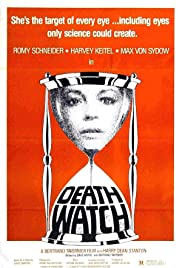Death Watch is one of the stranger entries in
Bertrand Tavernier’s somewhat underappreciated oeuvre – a work of speculative fiction
set in a world where death has been all but removed from public view, inflation
and poverty are running riot, and various population controls are in place, but
which looks and feels just like then-present day Glasgow. Romy Schneider plays Katherine,
a woman dying of an unidentified disease, a rare enough event that a TV
producer Vincent (Harry Dean Stanton) seeks to build a nightly show around her
(the film is prescient about the pending ascendancy of the intrusive reality
genre, although the show depicted here is more dour than anything likely to
occupy network prime time); to facilitate the production, his cameraman Roddy (Harvey
Keitel) has a camera embedded in his eyes, which will render him blind if he’s
ever exposed to darkness for more than a few minutes. The film is hard to place,
dispensing much of its information just in passing, although there are some
extended depictions of marginal people living in makeshift camps or sleeping in
charitable shelters: the main focus is on the growing relationship between Katharine
and Roddy as she flees from attention, not realizing that her traveling
companion is broadcasting her suffering to the world, a moral transgression for
which he eventually pays a predictable but still strikingly depicted price. The
final stretch reflects on the allure of withdrawal, of immersion into culture
and into the past, providing Katherine a small moral victory over the cynical Vincent
that nevertheless seems unlikely to have a lasting impact. It’s hardly a satisfying
arrival point in conventional narrative terms, but in its mixture of absence
and displacement and blindness and hopelessness, supports the film’s central
self-reflective ambiguity - that of whether we’re primarily watching Katherine’s
death, or our own.


No comments:
Post a Comment